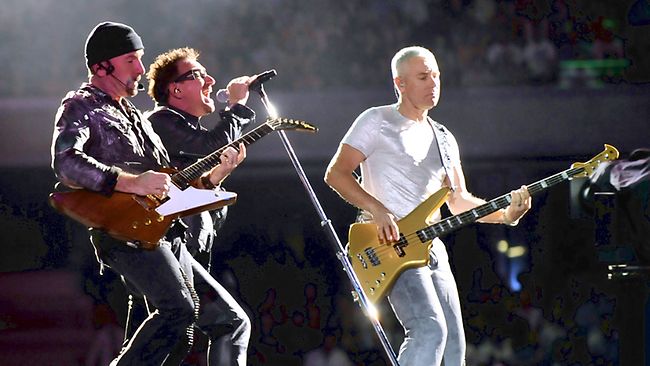U2 has announced they’ll be releasing a graffiti-inspired film series based on their current album, Songs of Innocence. The film project, which is due out in December, will be called Films of Innocence and feature 11 films by 11 different widely-celebrated urban artists to represent each of the album’s different tracks. U2’s Bono also recently defended new distribution methods, praising Spotify for its transparency despite the amount it pays to musicians.
Films of Innocence Available for Pre-order
Though U2 has not formally announced the release of Films of Innocence, the “visual counterpart” to the new U2 album has been available for pre-order on iTunes since at least 18 November so fans don’t miss out. Unlike the album Films of Innocence will not be free. Slated to come out on 9 December, fans will pay £6.99 for the regular version and £8.99 for the HD one.
The item description of Films of Innocence characterizes it as a project meant to celebrate the uniquely democratic power seen in urban art. They used Northern Ireland’s political murals as a reference and recruited 11 different well-known street artists for the videos: Todd James, DALeast, ROA, Maser, Vhils, Ganzeer, Chloe Early, Mode 2, D*Face, Robin Rhode, and Oliver Jeffers. Jefferson Hack, co-founder of the magazine Dazed and Confused, directed the project.
The result, according to U2, is a “powerful and cognisant” series of works that play with time, scale the globe, and weave around between animated dreamscapes and heightened reality.
The official trailer of Films of Innocence suggests an emphasis on stop-motion and animated work, including an aesthetic which is far away from Beyoncé’s “visual album” last year. Songs of Innocence is currently at No. 58 on the official UK albums chart.
Bono defends Spotify, calling for more transparency in the music industry
Despite criticism of what the service pays artists and songwriters, U2 lead singer Bono has praised Spotify and similar streaming music services as a way that musicians can get their work heard.
According to Bono, the real question is not digital downloads versus streaming, the real fight lies between transparency and opacity. In the past the music industry has “involved itself in quite considerable deceit,” Bono told attendees at Dublin’s Web Summit conference.
If we change that aspect of the music industry, Bono noted, so that artists can see how often their songs are being played, where in the world they are being played, see information about who is listening to their music, and be paid via direct debit, then he believes all this will add up to something and help make the world more transparent.
Bono in particular addressed the cut Spotify takes from artists’ payments. According to Bono the 70% of Spotify’s revenues that go to rights owners is actually quite good, it’s simply that artists don’t know where the money is as the record labels have not been transparent.
Bono feels that the key thing is a demand for transparency, and that the new model must be fair in its distribution. If or when that happens, he thinks the music business will become the rising tide which lifts all boats.

